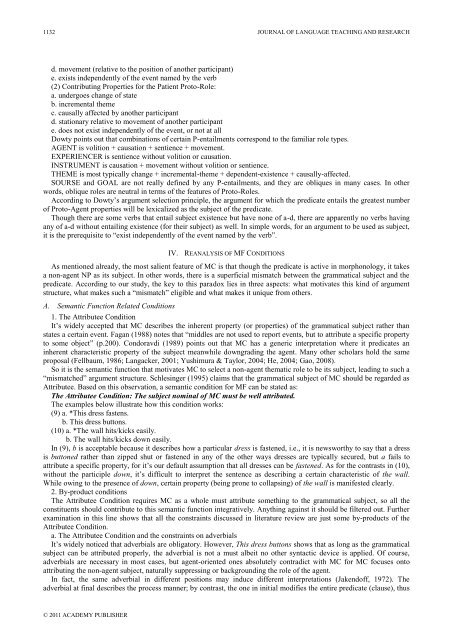Journal of Language Teaching and Research Contents - Academy ...
Journal of Language Teaching and Research Contents - Academy ...
Journal of Language Teaching and Research Contents - Academy ...
Create successful ePaper yourself
Turn your PDF publications into a flip-book with our unique Google optimized e-Paper software.
1132<br />
© 2011 ACADEMY PUBLISHER<br />
JOURNAL OF LANGUAGE TEACHING AND RESEARCH<br />
d. movement (relative to the position <strong>of</strong> another participant)<br />
e. exists independently <strong>of</strong> the event named by the verb<br />
(2) Contributing Properties for the Patient Proto-Role:<br />
a. undergoes change <strong>of</strong> state<br />
b. incremental theme<br />
c. causally affected by another participant<br />
d. stationary relative to movement <strong>of</strong> another participant<br />
e. does not exist independently <strong>of</strong> the event, or not at all<br />
Dowty points out that combinations <strong>of</strong> certain P-entailments correspond to the familiar role types.<br />
AGENT is volition + causation + sentience + movement.<br />
EXPERIENCER is sentience without volition or causation.<br />
INSTRUMENT is causation + movement without volition or sentience.<br />
THEME is most typically change + incremental-theme + dependent-existence + causally-affected.<br />
SOURSE <strong>and</strong> GOAL are not really defined by any P-entailments, <strong>and</strong> they are obliques in many cases. In other<br />
words, oblique roles are neutral in terms <strong>of</strong> the features <strong>of</strong> Proto-Roles.<br />
According to Dowty‟s argument selection principle, the argument for which the predicate entails the greatest number<br />
<strong>of</strong> Proto-Agent properties will be lexicalized as the subject <strong>of</strong> the predicate.<br />
Though there are some verbs that entail subject existence but have none <strong>of</strong> a-d, there are apparently no verbs having<br />
any <strong>of</strong> a-d without entailing existence (for their subject) as well. In simple words, for an argument to be used as subject,<br />
it is the prerequisite to “exist independently <strong>of</strong> the event named by the verb”.<br />
IV. REANALYSIS OF MF CONDITIONS<br />
As mentioned already, the most salient feature <strong>of</strong> MC is that though the predicate is active in morphonology, it takes<br />
a non-agent NP as its subject. In other words, there is a superficial mismatch between the grammatical subject <strong>and</strong> the<br />
predicate. According to our study, the key to this paradox lies in three aspects: what motivates this kind <strong>of</strong> argument<br />
structure, what makes such a “mismatch” eligible <strong>and</strong> what makes it unique from others.<br />
A. Semantic Function Related Conditions<br />
1. The Attributee Condition<br />
It‟s widely accepted that MC describes the inherent property (or properties) <strong>of</strong> the grammatical subject rather than<br />
states a certain event. Fagan (1988) notes that “middles are not used to report events, but to attribute a specific property<br />
to some object” (p.200). Condoravdi (1989) points out that MC has a generic interpretation where it predicates an<br />
inherent characteristic property <strong>of</strong> the subject meanwhile downgrading the agent. Many other scholars hold the same<br />
proposal (Fellbaum, 1986; Langacker, 2001; Yushimura & Taylor, 2004; He, 2004; Gao, 2008).<br />
So it is the semantic function that motivates MC to select a non-agent thematic role to be its subject, leading to such a<br />
“mismatched” argument structure. Schlesinger (1995) claims that the grammatical subject <strong>of</strong> MC should be regarded as<br />
Attributee. Based on this observation, a semantic condition for MF can be stated as:<br />
The Attributee Condition: The subject nominal <strong>of</strong> MC must be well attributed.<br />
The examples below illustrate how this condition works:<br />
(9) a. *This dress fastens.<br />
b. This dress buttons.<br />
(10) a. *The wall hits/kicks easily.<br />
b. The wall hits/kicks down easily.<br />
In (9), b is acceptable because it describes how a particular dress is fastened, i.e., it is newsworthy to say that a dress<br />
is buttoned rather than zipped shut or fastened in any <strong>of</strong> the other ways dresses are typically secured, but a fails to<br />
attribute a specific property, for it‟s our default assumption that all dresses can be fastened. As for the contrasts in (10),<br />
without the participle down, it‟s difficult to interpret the sentence as describing a certain characteristic <strong>of</strong> the wall.<br />
While owing to the presence <strong>of</strong> down, certain property (being prone to collapsing) <strong>of</strong> the wall is manifested clearly.<br />
2. By-product conditions<br />
The Attributee Condition requires MC as a whole must attribute something to the grammatical subject, so all the<br />
constituents should contribute to this semantic function integratively. Anything against it should be filtered out. Further<br />
examination in this line shows that all the constraints discussed in literature review are just some by-products <strong>of</strong> the<br />
Attributee Condition.<br />
a. The Attributee Condition <strong>and</strong> the constraints on adverbials<br />
It‟s widely noticed that adverbials are obligatory. However, This dress buttons shows that as long as the grammatical<br />
subject can be attributed properly, the adverbial is not a must albeit no other syntactic device is applied. Of course,<br />
adverbials are necessary in most cases, but agent-oriented ones absolutely contradict with MC for MC focuses onto<br />
attributing the non-agent subject, naturally suppressing or backgrounding the role <strong>of</strong> the agent.<br />
In fact, the same adverbial in different positions may induce different interpretations (Jakend<strong>of</strong>f, 1972). The<br />
adverbial at final describes the process manner; by contrast, the one in initial modifies the entire predicate (clause), thus

















